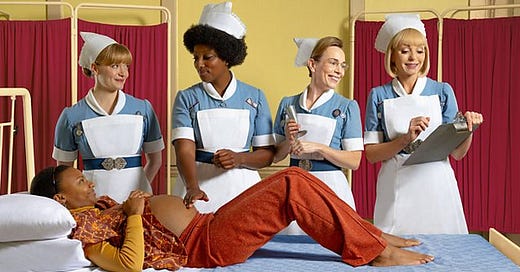Being big time BBC fans we inevitably wound up watching Call the Midwife. The Beeb describes it as “A heartwarming tale of life in London's impoverished East End. Midwives welcome new lives and care for the community in the changing times of the 50s and 60s.”
As usually happens with TV series, the first couple of seasons are superb, then things go somewhat downhill and get repetitive. This month we started re-watching from Season One, Episode One.
The story takes place in the poorest part of London, just after World War Two. The midwives of the title are connected to a religious order, and are the primary source of care for new mothers.
What strikes me this time when watching is of course the incredible poverty, the giant families living in tiny one or two room flats, with a shared toilet down the hall. The men - sometimes violent and drunk - work the docks, and the women stay home, pregnant, and care for the children. Births take place at home, with a midwife rather than a doctor.
This was an age before easy contraception, and when abortions were still illegal in Britain. One episode portrays an amateur abortion provider nearly killing a woman who simply couldn’t carry one more child. This at a time when being poor meant not having enough to eat, and when there were still people alive who had been banished to the workhouse.
It was a time when being female could be terrible and hopeless.
When that episode played my immediate thought was that this is exactly where the US has been going. Since the repeal of Roe vs Wade, and especially since Trump, the rights of women have been constrained dramatically. Already young women are dying in forced pregnancy and childbirth.
Not long after watching those episodes that I read a remarkable memoir by American author Jeannette Walls. The Glass Castle describes her childhood growing up with two very dysfunctional parents, moving from town to town, in extreme poverty, and ending up in a shack in a small town in the backwoods of West Virginia.
It’s a remarkable book, and moving, and reminded me very much of living in Appalachia. I knew families that poor, and homes that were barely four walls and a wood stove, and kids that lacked nearly everything that a young person needs to make their life a success.
And this book is set before OxyContin swept through the mountains.
I was reminded that this level of poverty is not accidental. That the lack of education and advancement that keeps people impoverished is also not accidental.
Once again I found myself thinking that this is exactly what the Trump government is doing right now. Cutting funding for schools. Cutting research and university funding. Gutting scientific research.
No rational person believes that any of this makes sense. It is obviously intended to tear down a nation, and the people forced to live within it.
Now Canada is heading into an election. Right now the Mark Carney Liberals are riding high, believing that their slim lead in the polls will make them the next government. I’m not convinced.
I remember when Dr Henry Morgentaler defeated Canada’s anti-abortion laws. I remember when the Civil Marriage Act was passed in 2005, allowing gay marriage.
But I also remember when a woman couldn’t open a bank account without her husband‘s signature, and when a divorce required that one or both people had committed adultery.
Just as the US is moving backwards, quickly, Canada could very easily go down the same road.
Please don’t let that happen.
03/17 Typo edits, plus a H/T to “The Handmaid’s Tale.”






Dead on Barry